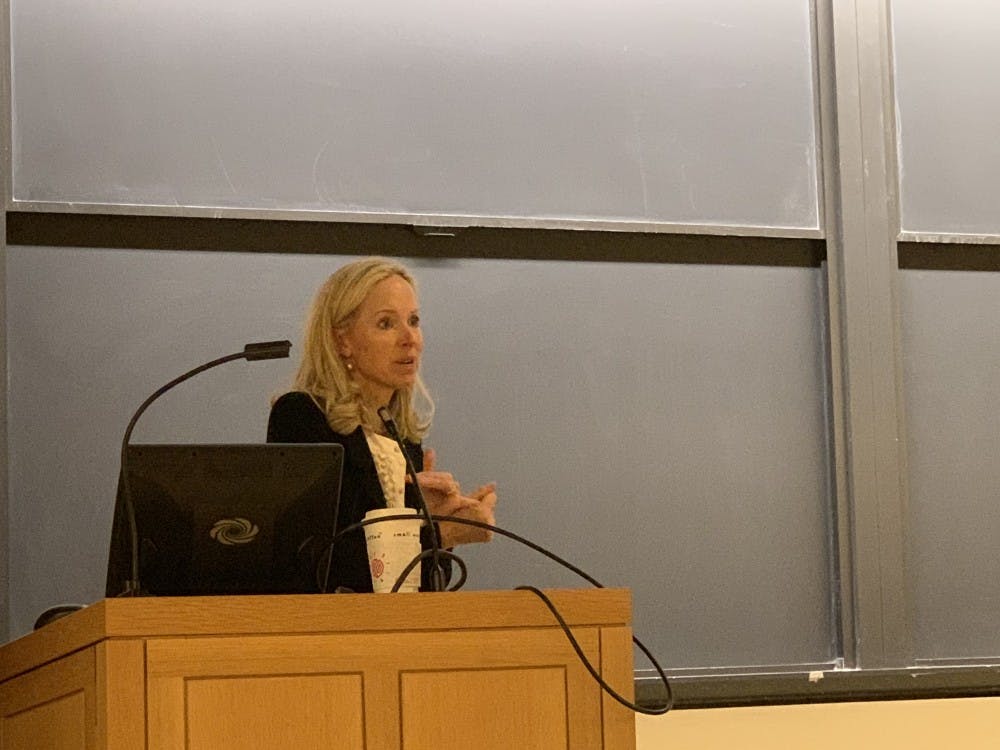The Supreme Court can do serious damage to reproductive rights without overturning Roe v. Wade, according to Lisa Frelinghuysen.
Frelinghuysen, a former law clerk for Supreme Court Justice Ruth Bader Ginsburg and current Planned Parenthood of New York City board member, spoke about reproductive rights at an event sponsored by Princeton Students for Reproductive Justice (PSRJ) on Nov. 14.
According to Frelinghuysen, reproductive justice, defined as whether or not a woman has access to reproductive rights, has become one of the most controversial issues in the country.
Reproductive justice, the heart of the women’s right movement, has come under tremendous attack, she explained.
In support of reproductive justice, she referenced the 1973 case of Roe v. Wade, which established that a woman’s right to terminate a pregnancy was a constitutional right protected by the notions of privacy and liberty under the 14th amendment.
However, Frelinghuysen said that Roe v. Wade could be overturned within the next few years. The current Supreme Court with five conservative justices out of nine puts Roe v. Wade at risk.
For example, Justice Brett Kavanaugh’s view on reproductive rights were not explicitly stated during his confirmation process.
“[There are] a lot of questions and not a lot of answers about his views on reproductive rights,” she stated.

Frelinghuysen explained that Roe v. Wade has the potential to be overturned because the right to privacy is not enumerated in the Constitution, but also emphasized that the Supreme Court can impact abortion rights in other ways.
“The Supreme Court can do a great deal of damage in reproductive justice without specifically overturning Roe,” said Frelinghuysen, who added that she does not think Roe v. Wade will be overturned right away.
She noted that there are currently 13 cases about reproductive justice that could end up at the Supreme Court, but she thinks that the Supreme Court will likely wait before making any monumental changes to abortion policy.
Because the Supreme Court just went through a “rocky confirmation hearing … that brought the Supreme Court down into the political muck of the country, [Chief Justice Roberts] probably wants to steady the ship and elevate the Supreme Court in the mind of the public,” Frelinghuysen said.

If Roe v. Wade is overturned, the states will decide whether or not to legalize abortion.
“Twenty-two states are likely to ban abortion outright. In eight additional states, including Washington D.C., the right to abortion is at serious risk,” Frelinghuysen said.
She explained that if the right to abortion is left up to individual states, the country will “go back to that two-tiered system that we had before Roe v. Wade where wealthy women will be able to get a safe and legal abortion, and poor women — disproportionately women of color, young women, rural women — will very likely not.”
She proceeded to enumerate several facts about abortion.
“Abortion is one of the safest medical procedures that exists,” said Frelinghuysen.
“One in four women in her lifetime will seek an abortion,” continued Frelinghuysen. “Ninety percent of abortions are performed in the first trimester, and most abortions are medical abortions where you take a pill. Abortion rates have decreased over the past several years.”
Twenty million abortions out of an annual average of 46 million were performed illegally, according to Frelinghuysen, and countries where abortion is illegal have a higher number of abortion related deaths.
“Liberal abortion laws don’t cause or increase abortions. Unintended pregnancies do,” Frelinghuysen said. “Reducing unintended pregnancies through effective contraception and education can really help to reduce incidents of abortion.”
Moving towards a bigger picture view, Frelinghuysen ended her talk on a positive note.
“I always like to remember in times like these that great change is not made by presidents or their administrations, but it’s made by movements of people, of we the people, of visionaries, innovative, committed people,” she said.
She concluded with a quote by Martin Luther King Jr.: “The arc of the moral universe is long, but it bends toward justice.”
Frelinghuysen proceeded to answer questions from the audience. When asked about which level of government to focus advocacy efforts on, Frelinghuysen said, “Right now, local activism and state activism is the way to go.”
She also expressed her hopes for audience members, saying, “This group right here is the group that’s going to do a number of really exciting things.”
She continued, “People are really interested in the young vote. This vote is waking up, this vote is here to stay.”
Frelinghuysen’s speech took place on Wednesday, Nov. 14, at 5 p.m. in East Pyne 010.








